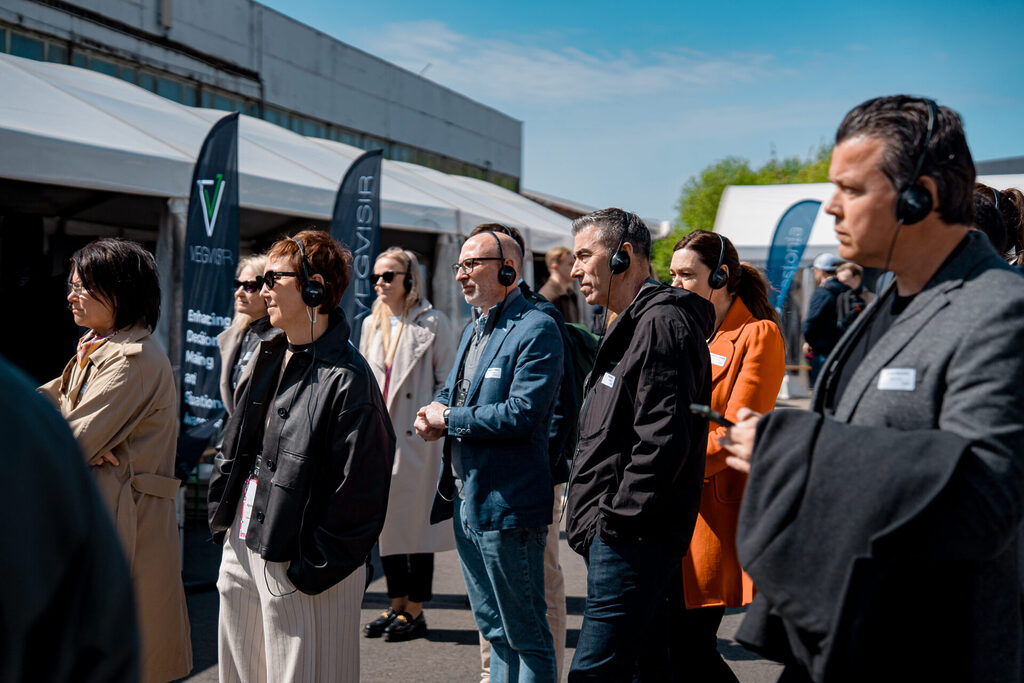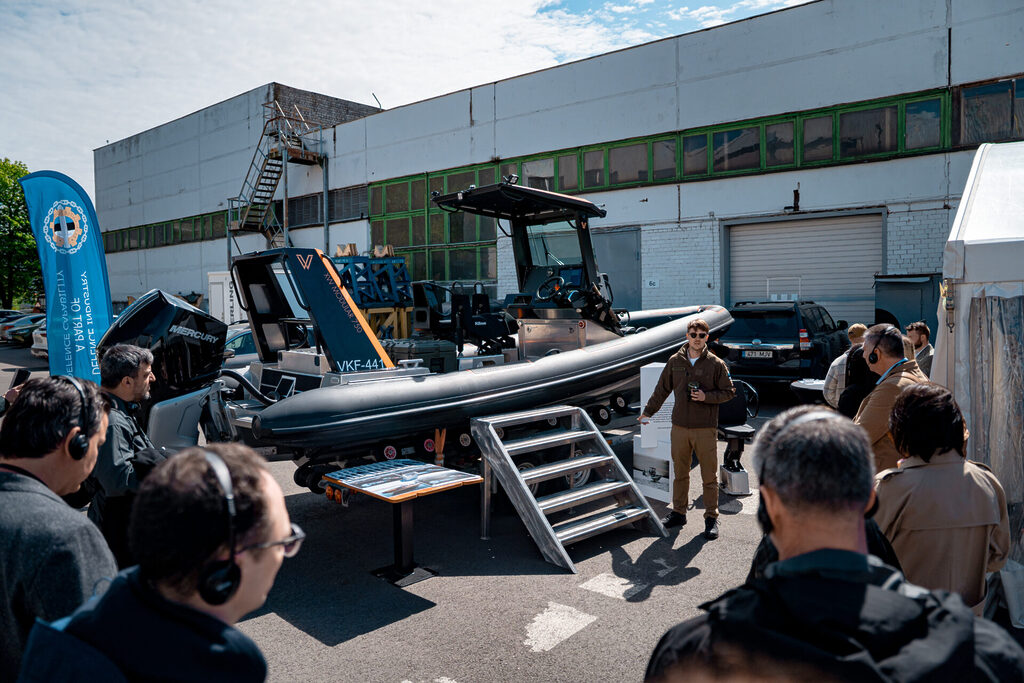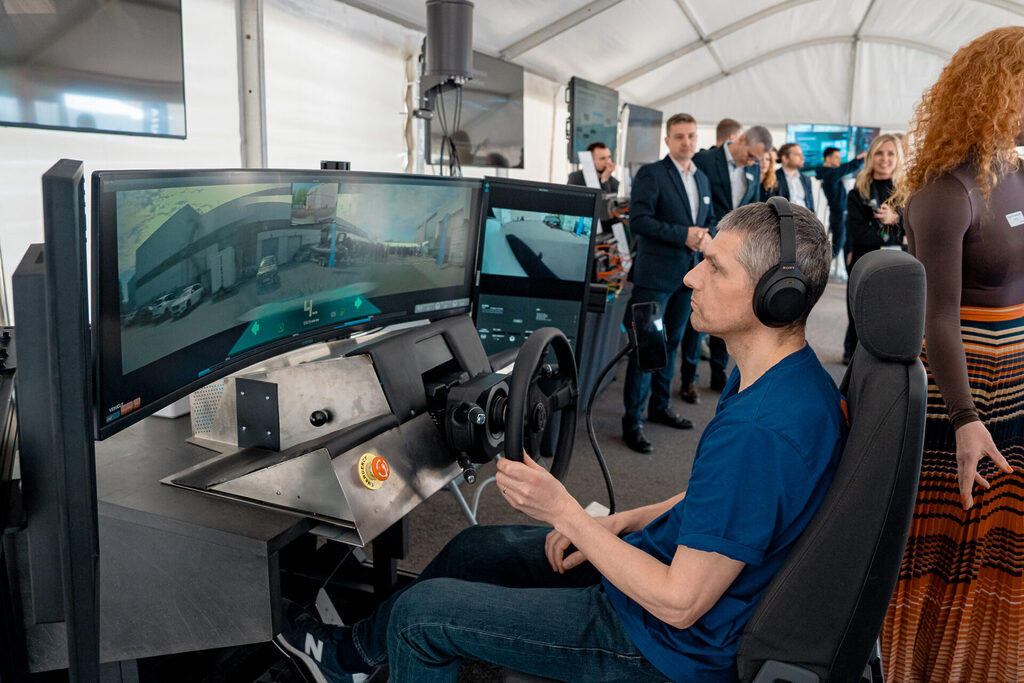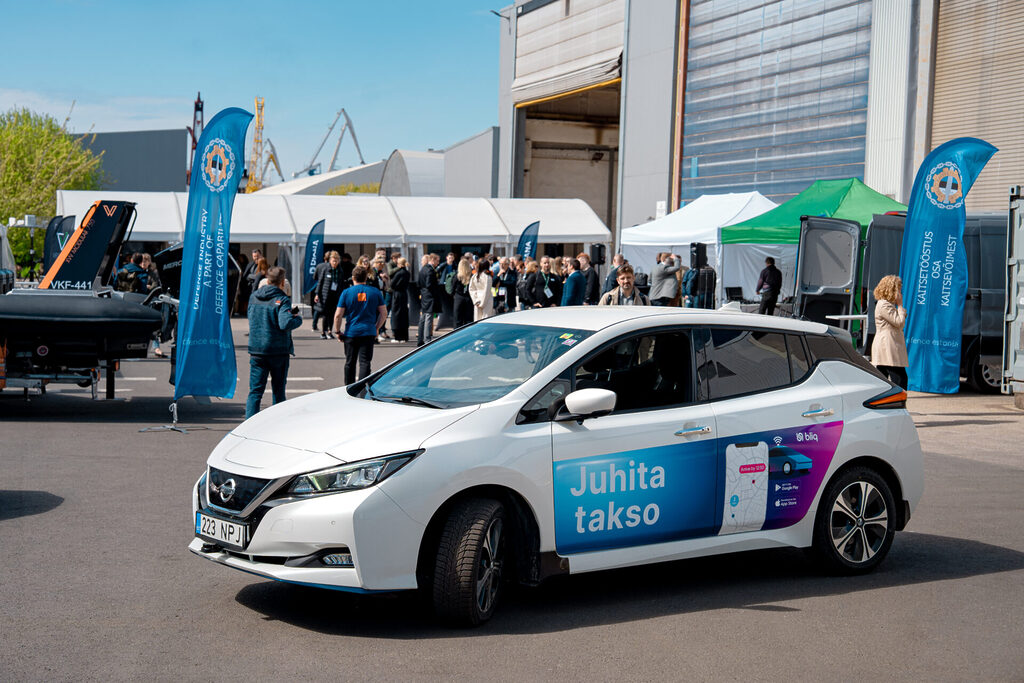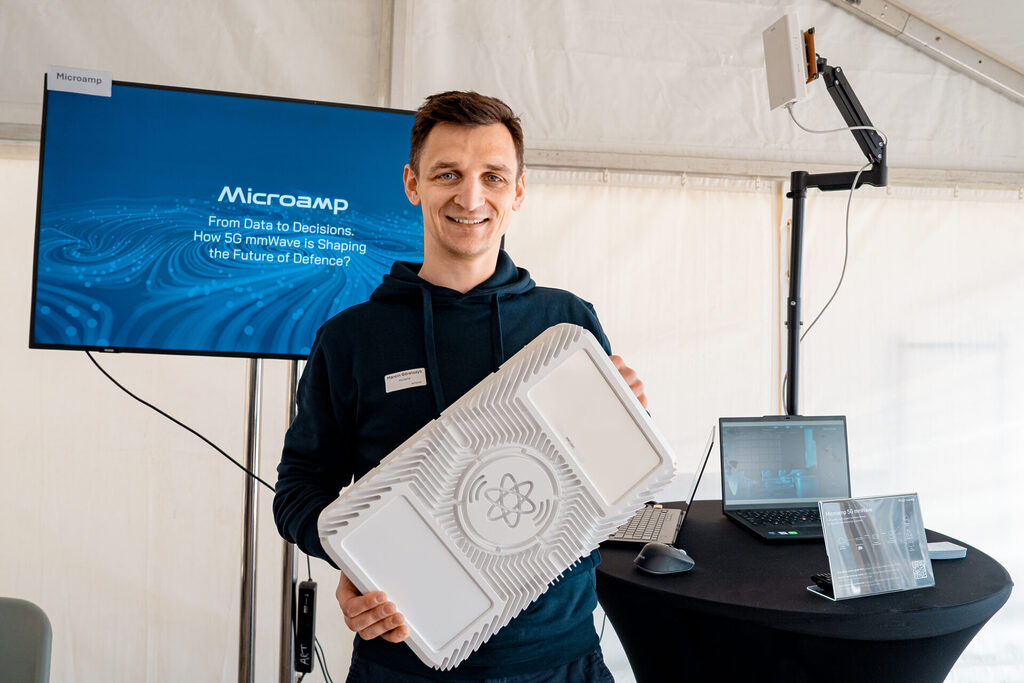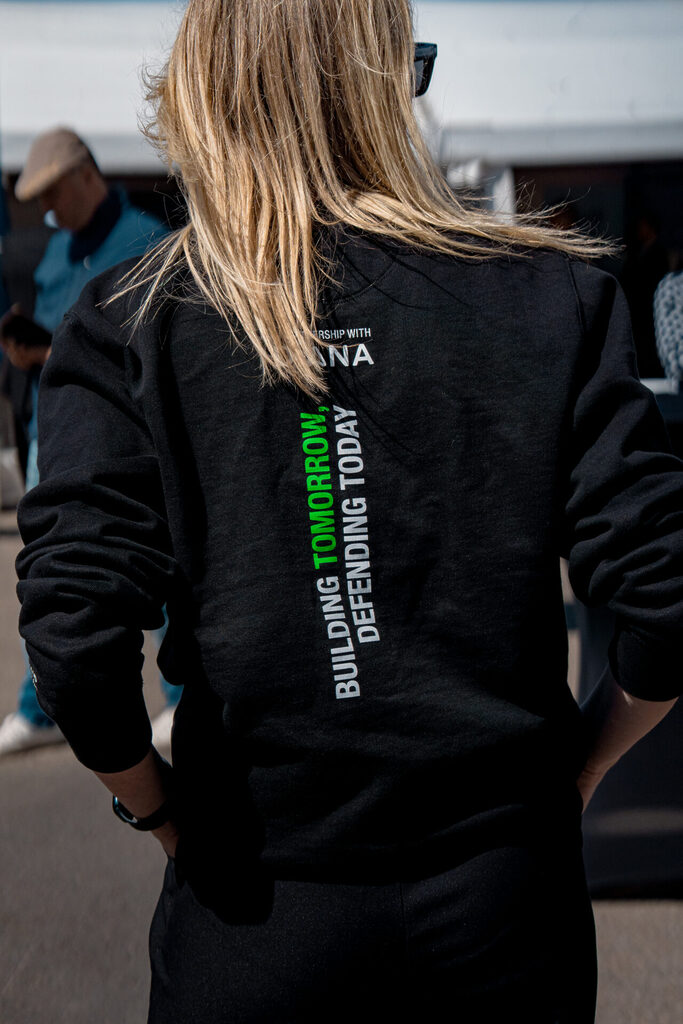How can startups contribute to national defence?
This time, Kuku Radio’s “Ettevõtlusminutid”, a radio show dedicated on entrepreneurship, focused on why it is important for startups and technology companies to contribute to national defence and how the NATO DIANA accelerator supports strengthening defence capabilities.
The discussion also covered Estonian companies that have successfully completed the NATO DIANA acceleration program and have already secured significant investments.
In addition, the conversation touched on the upcoming Defence Innovation Day, which will take place on September 22 at Kultuurikatel. The event is open to all interested participants — more information and registration available here.
The guest on the show was Sabina Sägi, Community and Communications Manager at NATO DIANA’s Estonian accelerator. The show was hosted by Ingela Virkus.
Many thanks to the Estonian Chamber of Commerce and Industry for the invitation!
Listen to the episode (in Estonian):
Startup Story: Spiiker X Tehnopol Startup Incubator
Every year, dozens of high-potential startups develop their products or services in the Tehnopol Startup Incubator acceleration program. One of them is Spiiker—let’s get to know them better!
Spiiker is an AI-based AAC (Augmentative and Alternative Communication) application that automatically converts communication images into speech, helping people with speech difficulties express themselves clearly.
Spiiker was founded by Elery Vaik and Georg Sten Toots. Elery has a background in service design and occupational therapy and has worked with people with special needs for years. Georg is a UI/UX designer and software developer. Elery introduced us to Spiiker’s story.
How did the idea to start your own startup come about?
“The idea came directly from practice—working as an occupational therapist, I faced a daily reality where high-tech communication image tools were either too complicated, too expensive, or just ridiculously ineffective (read: extremely time-consuming). Clients kept asking if there really wasn’t a ‘normal’ solution out there. When I shared my frustration with Georg, I finally felt like maybe we didn’t just have to roll our eyes—maybe we could actually make something better. And so we started!”
What has been your biggest challenge or failure so far, and your greatest win?
“The biggest challenge so far has definitely been finding funding—a good idea is great, but without money it remains just a good idea. Our greatest win has been the honest and direct feedback from users and professionals—questions like ‘Why hasn’t this been done before?’ keep coming up. That confirms that what we’re doing is truly needed!”
What sets your startup apart from the competition?
“We use AI to generate communication images (pictograms)! Our biggest strength on the Estonian market is Estonian-language speech synthesis—though the solution supports other languages too, with the potential to scale internationally. The app can be used on any smart device and via the web—yes, this is still a major issue in 2025, and our solution addresses it.”

Why the Tehnopol Startup Incubator?
“Everyone had seen potential in us before, but no one was truly willing to help—until we reached the Tehnopol Startup Incubator. They were the first who not only listened but also said: ‘Let’s do this!’ In just four months, we’ve gone from a design concept to an MVP, and we believe that this is where our solution will finally gain the momentum we’ve long been seeking.”
Where do you see your startup one year from now? And five years from now?
“One year from now, Spiiker’s full version will be on the market and we’ll have over 2,000 active users. Five years from now, Spiiker will be a familiar name to many families and professionals. Hopefully, we’ll have expanded into neighboring countries and gained the trust of over 20,000 users.”
Who will be the next Estonian unicorn?
“Lightyear! We’re also rooting for 7sense! And hopefully in the future—it will be us too!”
What books, podcasts, publications, or industry experts do you follow and recommend to other early-stage startup founders?
“I’m a big fan of books! I recommend J. Margus Klaar’s ‘How to Get More Value from Your Product’—it’s clear, straightforward, and practical. For generating ideas, my secret weapon is ‘The Design Thinking Toolbox’—like a Swiss Army knife for service designers, all nicely unpacked according to the design cycle. For managing emotional chaos (and let’s be honest, there’s plenty of that in startup life), I recommend Liz Fosslien and Mollie West Duffy’s ‘Big Feelings’—an honest and human read that helps you make sense of what’s really going on in your head. And honestly, my biggest tip? You can set up PubMed alerts with the right keywords to receive relevant scientific updates straight to your inbox—this way I always stay up to date with new professional literature.”
The Tehnopol Startup Incubator will start accepting new applications from August 11. Follow our channels and register your interest today to get early updates!
Estonian startup Wayren’s technology was successfully tested during HIMARS live-fire exercise
At the first live-fire exercise of HIMARS rocket launchers conducted by Estonian Defence Forces on Saaremaa, the critical communication technology developed by Estonian defence industry startup Wayren was successfully tested. This technology ensures vital communication between units even when traditional communication systems are no longer operational. Wayren participated in the NATO DIANA Estonian Accelerator.
Reservists participating during the exercise of the division’s artillery battalion’s rocket artillery battery used Wayren’s Singularity software, which enabled them to share location information and functioned as an additional communication mechanism for organizing logistics. Thanks to the light and scalable nature of Wayren’s technology, its use was expanded during the exercise to also provide location sharing for intelligence and weapons-level data transmission.
Wayren’s CEO and co-founder Henry Härm stated that the live-fire exercise simulated a highly realistic situation where, due to complex terrain and dynamic condition, conventional communication solutions fail – “The results showcased that our technology is reliable and simple to use. The Singularity software kept the units operational even under extremely difficult conditions,” said Härm.
Wayren’s CSO and co-founder Tarmo Aia noted that the exercise demonstrated the necessity of their solution for defence forces, for whom reliable communication is vital for success in their primary tasks. “We are proud that our efforts in developing lightweight hybrid mesh network technologies have borne fruit. This gives us confidence to continue investing in this field,” Aia added.
The exercise held on the Undva Peninsula in Saaremaa took place from the 4th to the 12th of July and aimed to improve the unit’s combat readiness, develop interoperability, and reinforce soldiers’ knowledge and skills in using weapons systems. The M142 HIMARS artillery rocket launchers are considered one of the most modern long-range indirect fire systems in the world. Their introduction into the Estonian Defence Forces marks a significant increase in national defence firepower in both strength and range.
Wayren is a startup founded five years ago by three former cyber defence personnel members — Henry Härm, Oliver Tiit, and Tarmo Aia. This spring, Wayren signed a strategic investment agreement worth 7.9 million euros.
The Singularity communication platform developed by Wayren enables reliable communication on the battlefield between soldiers, command staff, and various platforms under challenging conditions. The company’s patent pending system creates a robust hybrid mesh network connecting units, vehicles, or command posts, synchronizing data in parallel through various civilian and military communication technologies. Currently, the system has been delivered as a pilot project to the Estonian Defence League and is actively tested by the Estonian Defence Forces and in Ukraine.
Wayren recently successfully completed the NATO Diana accelerator, being one of only two Estonian companies selected for this year’s group.
Cybersecurity’s quantum leap: A field full of opportunities
The article was published on June 18 in FoundME.
Liina Kamm, Senior Researcher at Cybernetica, and Marion Lepmets, CEO of SoftComply, shed light on the hottest current topics in cybersecurity and artificial intelligence. Startups have several advantages over industry giants, and keeping these in mind, it’s definitely worth applying to the Cyber Accelerator by July 13.
How can we be sure that novel cybersecurity solutions don’t actually increase data protection risks? How do we balance their security with practical benefits? Amid this rapid development—who’s steering the ship? And how can startups compete with major players?
According to Liina Kamm, Senior Researcher at the Institute of Information Security at Cybernetica, the rapid development and increasing accessibility of AI tools has created both exciting opportunities and new problems. “The more powerful AI becomes, the more we trust it—and the more it can help us. But we must still keep a clear mind and critically assess whether the outputs, suggestions, and decisions are logical and justified,” she explains.
“There are now a lot of new tasks specifically related to AI risk management,” Kamm points out. “The more complex the system and the more critical the tasks, the more detailed and well-thought-out the risk management must be.”
Many companies today claim that their services are powered by AI, but it’s hard to evaluate whether it’s truly a learning system or just a set of automated algorithms. If it is a learning system, how can we ensure that it evolves at a reasonable pace and doesn’t become overly autonomous?
Another big dilemma is balancing data processing with security. Complex AI-powered language models, such as Phishbite, can detect patterns and spot even the smallest behavioral changes to help protect businesses from cyberattacks. However, such AI-based solutions often require processing sensitive data in the cloud, which raises concerns about data security.
Kamm lists key risk areas as data quality, data accessibility, bias, and user education. “The quality of an AI model is highly dependent on data quality—volume, bias, and accuracy all play a major role,” she explains.
“By accessibility, I mean whether intellectual property and individual rights and privacy are protected. For instance, there is far less Estonian-language content than in globally dominant languages,” she adds. “There are many types of bias—from historical to algorithmic—and unfortunately, all of them affect AI systems. So AI still can’t make decisions on its own; it needs decision support. But even that can be risky, since humans also make mistakes, and if AI provides a plausible justification, it may be difficult to make an objective decision.”
This leads to the last—and arguably most important—topic: educating people. “The more people understand how AI systems work, what risks and biases exist, the easier it is for them to use the results and make decisions based on them,” says Kamm.
“You have to know how to ask the right questions in the right way—that’s when you’re most likely to get good and consistent answers from AI,” she confirms.
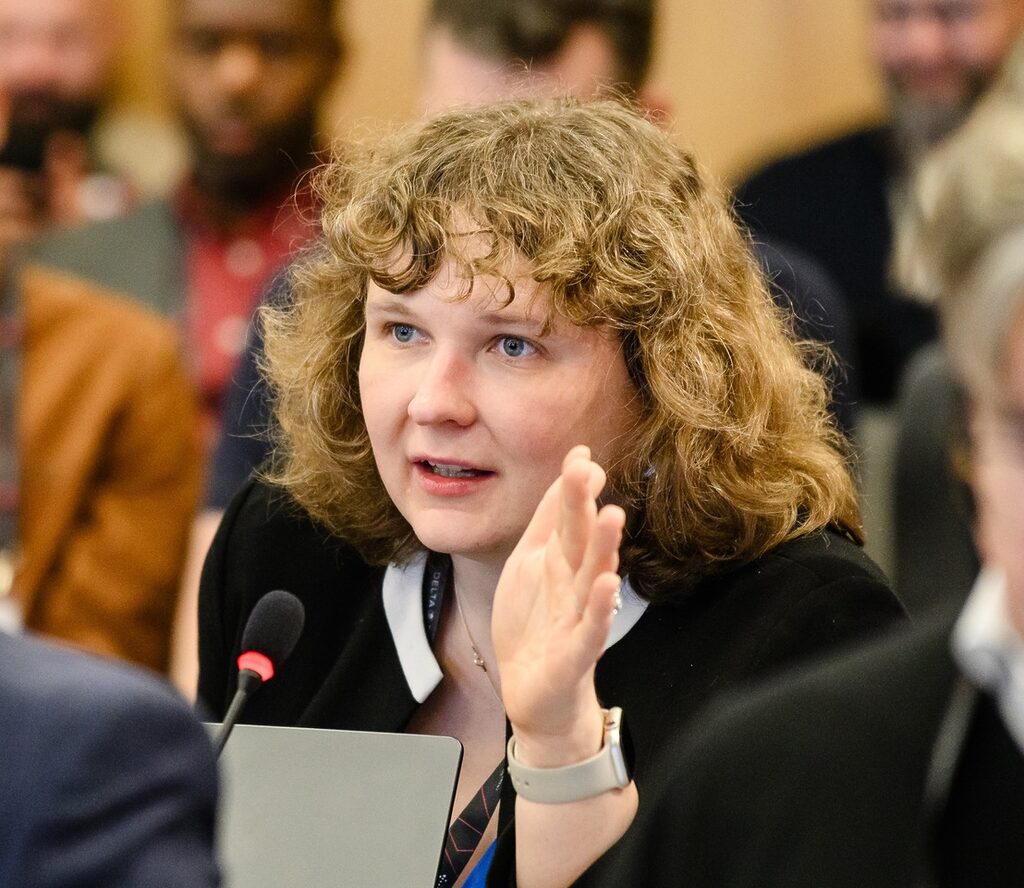
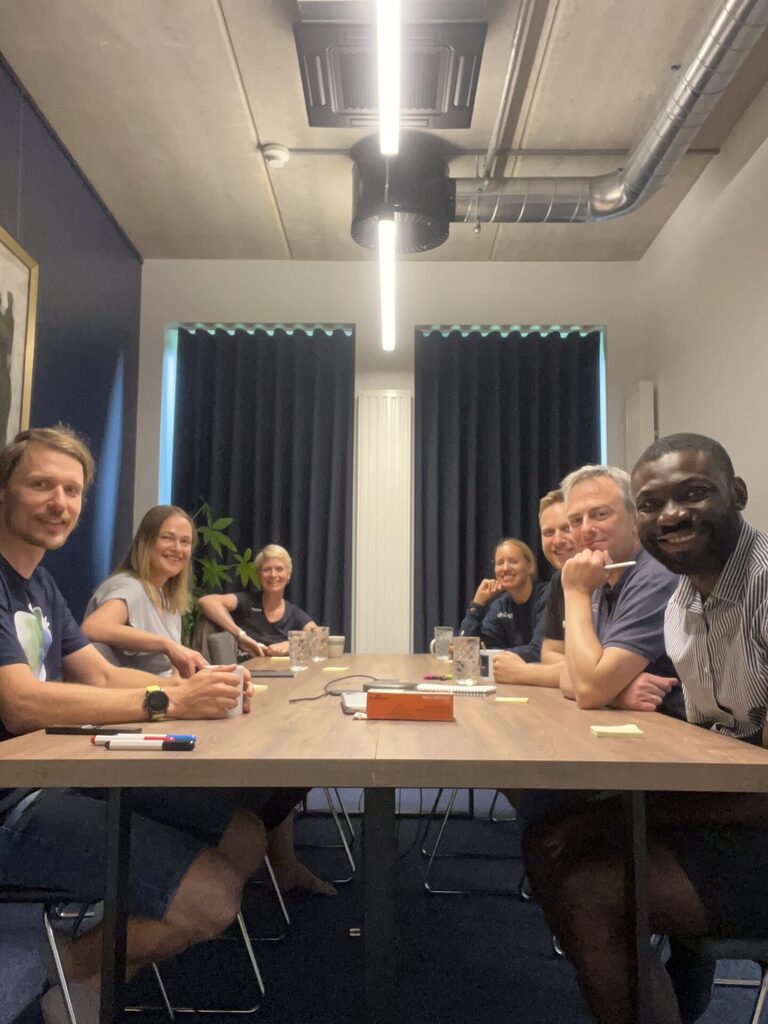
Control is critical
According to Marion Lepmets, founder and CEO of SoftComply, which develops risk and document management applications, we all consume an enormous amount of software and services daily. “It’s hard to believe any of us truly has full control over our own data,” she notes.
SoftComply builds applications for risk and document management specifically aimed at manufacturers of medical devices and other safety-critical products. Their clients include NASA, Formula 1 Racing, Rheinmetall, and major U.S. medical firms like ThermoFischer and Dentsply Sirona.
Lepmets stresses that today, cybersecurity must be a top priority for any product whose safe usage is critical and that includes significant software components or is entirely software-based.
On one hand, there’s still no clear standard for how much of a role AI should play in safety-critical products or how it should be evaluated. On the other hand, increasing regulations—especially in the EU—are slowing down time-to-market for new products, Lepmets points out.
Startups have several advantages
Compared to big players like Microsoft, Palo Alto, and CrowdStrike, smaller companies may seem overshadowed. However, the cybersecurity market holds a place for everyone—there are plenty of areas where startups can become strong competitors through targeted research, niche focus, and innovation.
According to Kamm, startups can more easily integrate AI into their systems, products, and services. “They’re not burdened by legacy systems, so they can create standout and cutting-edge solutions. But it’s crucial to analyze where the data flows—does it, for example, leave Europe?—and at least assess the key risks to inform customers of potential threats,” she advises.
One great way for startups to break into the cybersecurity and AI space is to join an accelerator. The Cyber Accelerator, organized by the Tehnopol Startup Incubator and the Estonian Information System Authority (RIA), is designed specifically to support early-stage cybersecurity startups and spin-offs.
SoftComply received valuable support from the Cyber Accelerator. Previously focused on product risk management from a safety perspective, they expanded into cybersecurity capabilities thanks to the accelerator program.
“AI development has been powerful, but incorporating it into safety-critical product development is very complex and tightly regulated—it imposes additional demands on companies, so they must thoroughly assess whether AI is truly worth pursuing,” Lepmets explains. “During the accelerator, we were able to focus specifically on how to help our users manage cybersecurity risks better.”
She adds that startups’ key advantage is flexibility, allowing them to quickly respond to market changes and develop new ideas fast. “Our strength is definitely our adaptability and speed. For us, it’s not unusual to turn a new idea into a product within weeks—and that gives customers the sense that they are truly being heard,” says Lepmets.
SoftComply has participated in several accelerators, but they particularly appreciated the Cyber Accelerator’s style and unique features. “Its practical focus was impressive—strong expert mentors and engaging interactive workshops where experience and know-how were shared,” says Lepmets.
The accelerator program kicking off this fall offers selected teams €60,000 in funding, field-specific mentoring, and training that helps bring innovative cybersecurity solutions to market faster.
This year, the accelerator is focused on solutions that address and mitigate cybersecurity threats emerging alongside digitalization—for example, process automation, AI applications, countering social engineering, quantum-proof cryptography, or cybersecurity in the space sector.
The application deadline is July 13. Apply HERE!
Startup Story: Scaleout Systems X NATO DIANA Estonian Accelerator
Scaleout Systems is redefining how machine learning (ML) is deployed in privacy-sensitive environments. Traditional centralised AI development requires organisations to consolidate sensitive data in a single location. This process raises significant privacy, security, and regulatory concerns. Scaleout’s software platform solves this by orchestrating machine learning across edge, cloud, and secure environments, bringing computation as close to the data as possible. At the heart of the platform is federated learning, a privacy-first method that enables collaborative model training across distributed devices without transferring raw data.
How did you come up with the idea to create a startup?
We had started working on federated learning in our distributed scientific computing group at Uppsala University in Sweden. We quickly realised that this technology was going to become a foundation layer in the ML stack for applications that require strict control over data ownership and privacy, and we wanted a focused approach to making it operational.
What has been your biggest win so far?
We were fortunate to engage early with innovators at large enterprises, such as Scania CV.
What sets your startup apart from competitors?
Scaleout Systems helps companies use artificial intelligence (AI) without putting sensitive data at risk. Usually, to train AI, all the data must be sent to one central place but that can create privacy and security problems. Scaleout’s technology works differently: it allows the AI to learn from the data where it already is, like on local devices or in secure systems, so the data doesn’t have to be moved. The federated learning approach allows different organisations to work together on AI projects while keeping their data private and safe.
From the beginning, we have had a clear vision for how to bring federated AI to production. We are deeply rooted in ML research, but have always stayed focused on evolving the roadmap together with early adopters at mission-critical organisations and enterprises.
Why did you choose the NATO DIANA accelerator?
We had realised what impact edge AI* and federated learning could have for defence applications. Applying to DIANA was a natural next step to learn and to evolve our dual-use strategy.
Where do you see Scaleout in 5 years?
In 5 years, Scaleout Edge will be the go-to platform for mission-critical AI in the edge-to-cloud continuum**. We have accelerated progress towards next-level autonomous systems and helped safeguard and scale AI for NATO and allies.
Which books or podcasts in your field do you follow, and would you recommend them to other aspiring entrepreneurs?
Right now, I am reading ”Cognitive Electronic Warfare” by Karen Haigh and Julia Andrusenko. For startup life, I like listening to the Y Combinator podcast – always entertaining and informative.
*Edge AI refers to running artificial intelligence directly on local devices, like sensors, drones, or other hardware – rather than relying on a central server or cloud. This makes it faster, more private, and often more reliable, which is especially important in critical situations like defence.
**The edge-to-cloud continuum refers to the seamless integration of computing across a range of environments – from edge devices (like sensors and drones) to central cloud systems. It means AI can run smoothly wherever it’s needed, whether close to the data source or in a powerful data centre, allowing for faster, more flexible, and more secure decision-making.
The Estonian accelerator is implemented by Tehnopol Startup Incubator together with Sparkup Tartu Science Park.
Four Estonian space startups receive €240,000 in funding
The Estonian Business Incubator of the European Space Agency (ESA BIC Estonia) has selected four new space-tech startups in its latest call: Babayte, Spiral Hydrogen, MS Forest, and Energy Risk Service. Each company will receive a development grant of €60,000 — half of the funding comes from the European Space Agency and the other half from the cities of Tartu and Tallinn, depending on the startup’s location.
A total of 11 strong candidates pitched their ideas to the ESA BIC Estonia consortium. Although the initial plan was to select three companies, the high quality of the applications led to the selection of four. One spot remains open for the upcoming autumn round.
The selected startups are:
- Babayte (Tartu) is developing BabAI Orbital — an onboard AI module for small satellites that helps avoid collisions.
- Spiral Hydrogen (Tartu) is creating a next-generation hydrogen generator with over 90% energy efficiency.
- MS Forest (Tallinn) is building a dynamic forestry data registry that reduces the time and cost of forest inventory.
- Energy Risk Service (Tallinn) is developing a satellite data-based forecasting system for the renewable energy sector.
Madis Võõras, Head of the Estonian Space and CERN Office, affirmed the high quality of the candidates: “The number, quality, and substance of the applications submitted for evaluation impressed the panel — but also made the selection process challenging. That’s why we ultimately decided to accept four candidates instead of the initially planned three.”
Kristiina Libe, Project Manager for Deep Tech at Tehnopol (pictured), emphasized that space technology is no longer just about solving problems in space: “There’s a growing recognition of how satellite data and other space-based technologies can be applied for the benefit of our planet. We welcome applications from companies with the ambition, dedication, and expertise to take space technology to the next level — both on Earth and in orbit.” She added that the accelerator’s mission is fully aligned with Tehnopol’s goal of supporting world-changing tech companies and innovation.
Sven Lilla, Head of the Space Sector at Tartu Science Park and Manager of ESA BIC Estonia, also highlighted the increasing relevance of space technologies in everyday life and the willingness of companies to take bigger risks in order to gain a competitive edge: “This round saw a notably high number of foreign founders among the applicants, demonstrating the growing attractiveness of Estonia’s ecosystem,” added Lilla.
Paul Liias, Head of Space at the Ministry of Economic Affairs and Communications, noted that the state actively supports deep tech development and entrepreneurship through ESA BIC: “Through ESA BIC investments, the government accelerates the growth of the capital-intensive deep tech sector, helping Estonian startups take their first steps and gain experience working with ESA.” He added that over the past eight years, the ESA BIC model has proven successful in preparing companies for investment and market entry.
The ESA BIC Estonia incubator is led by Tartu Science Park in collaboration with the Tehnopol Science and Business Park. The program is co-financed by the European Space Agency and the cities of Tartu or Tallinn, each contributing €30,000 per company.
To date, 36 companies have joined the Estonian incubator — half based in Tartu and half in Tallinn. Tartu has invested €355,000 into the program, with incubated companies generating over €6 million in labor taxes and nearly €10 million in revenue. Tallinn has contributed €345,000, with its companies contributing nearly €5 million in labor taxes and generating over €12 million in revenue.
More information: www.esabic.ee
Uzbekistan and Estonia hosted an international pitch session together
On June 5, Tehnopol brought together ten startups — five from Estonia, five from Uzbekistan — for an online pitch session, where the companies presented their business ideas. Investors from both countries, including EstBAN representatives Olga Luštšik, Kati Vabi and Greta Pudan, participated to explore investment readiness and potential cooperation opportunities.
According to the investors, the startups were at very different stages of development — some had only built their MVP, while others already had a customer base and recurring monthly revenue (MRR).
From Estonia, the following startups presented their idea to Uzbek investors:
- FMA (Find My Accountant)
- GaaSAI
- Antscape
- TraynMe
- Leadfellow
“As it became clear, the level of digitalization of services in Central Asia is still low, meaning there are many so-called ‘low-hanging fruits’ — unsolved problems that could be addressed with simple and valuable solutions,” commented Olga Luštšik. “At the same time, most of the local startups are focused on their own region, and few showed global ambitions — which is understandable, considering they operate in a large and growing domestic market. In that sense, this can even be seen as an advantage compared to Estonian startups,” she added.
For Uzbek investors, Estonian startups might have seemed significantly more mature in terms of solutions and product development, and the differences in focus and complexity sometimes made it difficult to relate to the pitches.
“I wouldn’t necessarily say that Estonian startups felt like ‘science fiction’ to Uzbek investors,” noted Luštšik. “Rather, the two ecosystems are solving different types of problems, shaped by their respective digital maturity levels and market needs — and that difference was clearly visible.”
“This kind of cross-border pitch session is incredibly valuable for both startups and investors. It helps founders gain fresh perspectives on how their solutions are perceived in different markets and gives them a chance to test the scalability of their ideas,” said Kätlin-Carolin Noormägi, Community Manager at Tehnopol Startup Incubator. “We see a lot of potential in fostering deeper ties between the Estonian and Uzbek startup ecosystems — there’s so much to learn from each other.”
Events like these help investors map the maturity level of different markets and assess the potential for cross-regional collaboration. They also play an important role in building the first connections between ecosystems that have had limited interaction so far. Tehnopol is EstBAN partner member and they have several startup-supporting programs ongoing.
The article was initially published at EstBAN’s website.
Startup Story: Factiverse X NATO DIANA Estonian Accelerator
Factiverse extracts crucial and reliable real-time insights from news, live broadcasts, YouTube, TikTok, and Telegram. It was founded on this mission in 2021 by Dr Vinay Setty, and award-winning journalist Maria Amelie. Factiverse’ vision is to create a world where every organisation can confidently assess the reliability of digital information, empowering knowledge and democracy through trustworthy insights amidst the overwhelming noise of inaccuracy and the efforts of bad actors.
How was the startup idea born?
The idea for Factiverse started in 2016 when Vinay Setty decided to do academic research on the possibility of using machine learning and artificial intelligence to fact-check statements made on social media and in the news. Once the solution had been thoroughly tested and peer-reviewed, Vinay joined forces with journalist Maria Amelie as co-founders to bring this solution to the media sector to tackle the growing problem of misinformation and disinformation online.
What has been the biggest challenge so far? What about the biggest obstacle & largest win?
The biggest challenge has been the constant comparison to large language models like GPT, which are shown to produce less accurate results when compared to Factiverse.
The largest obstacle has been educating the market on the difference between general AI tools and our precision-focused technology.
Our biggest win to date was securing a contract with a government sector organisation to support their disinformation detection efforts.
What differentiates Factiverse from the competition?
Factiverse stands out through its foundation in years of academic research, with peer-reviewed capabilities developed alongside strategic partners. Using our patented technology and the world’s largest fact-checking database gives us unmatched technical depth. Combined with our unique position and global network of partners in media and fact-checking, we offer a level of credibility and scale that sets us apart in the market.
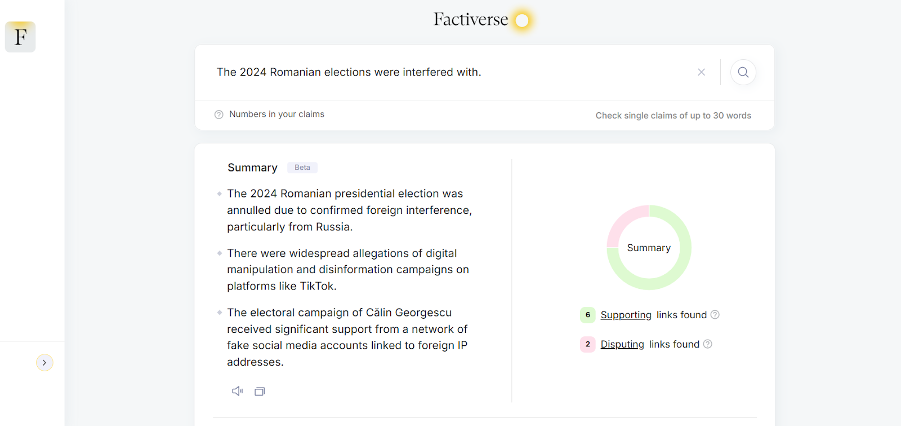
Why did you apply to the NATO DIANA accelerator?
Factiverse wanted to join NATO DIANA because we believe that our technology and product could be applied to the government and defence sector to help them detect harmful narratives. By being part of NATO DIANA, we could have opportunities to have direct access to those stakeholders and ensure that we are developing our solutions that meet the security challenges that they’re facing now. The understanding of this industry that NATO DIANA gives allows Factiverse to scale exponentially in this sector.
Where do you see Factiverse in 12 months’ time? How about in 5 years?
Factiverse has massive potential for growth over the next 12 months. With customers in both media and government, we are running more live fact-checking sessions with media broadcasters, launching our online fact-checking community, and implementing a series of product updates.
Given our current trajectory, in the next 5 years, we would like to be THE go-to company to give accurate and credible insights to organisations both in the private and public sectors.
Who will be the next unicorn in Estonia or in your home country?
In Norway Curipod or Databutton. In Estonia Wayren (*also part of batch #2 of the NATO DIANA Estonian accelerator).
Which books and podcasts in your field would you recommend to other startup founders?
Books: Factfulness by Hans Rosling & Actionable gamification by Yu-Kai Chou
Podcasts: The Weekly Show with Jon Stewart & Business Wars with David Brown
On the photo (from the left): Vinay Setty, Maria Amelie, Gaute Kokkvoll
The Estonian accelerator is implemented by Tehnopol Startup Incubator together with Sparkup Tartu Science Park.
Bringing bold ideas to the frontline: EUDIS Hackathon spring edition winners announced
The second edition of the EU Defence Innovation Scheme’s (EUDIS) Defence Hackathon “Rapid Defence Solutions for the Ukrainian Battlefield and Beyond” was held from 9 to 11 May 2025 across eight EU Member States: Poland, Lithuania, Latvia, Germany, Denmark, Czechia, Spain, and Italy.
This spring edition focused on supporting Ukraine amid the ongoing war by developing prototypes, ideas, and solutions for military battlefield applications. For the first time, the hackathon also welcomed participants from Ukraine, fostering collaboration between Europe and Ukraine for EU and Ukrainian defence and security. On 11 May, each location announced its winning team, which gained the opportunity to participate in the EUDIS two-month mentorship programme and present their solution at the final pitching competition on 9 July 2025!
The Tehnopol Science and Business Park led the Central Hub of the EUDIS Hackathon, coordinating the activities of eight local organisers and supporting seamless international collaboration throughout the event. The Central Hub programme was hosted by Triin Ilves.
A platform for groundbreaking defence innovation
Over three days, teams collaborated and competed to develop the most promising solutions for EU defence capabilities. During the weekend hackathon, during Central Hub streams participants heard welcoming and keynote speeches from Andrius Kubilius, European Commissioner for Defence and Space; Hanno Pevkur, Minister of Defence of the Republic of Estonia; Maj. Gen. (Ret.) Volodymyr Havrylov, former Deputy Minister of Defense of Ukraine; and Laura Elise Arvisto from defence startup Galttech. Additionally, participants were supported by numerous speakers, mentors and experts to refine their ideas. Each location hosted exciting local activities and offered prizes for the winning teams, including cash awards, mentorship hours, and a trip to Ukraine to test their solutions in real-life scenarios.
Participants tackled challenges that included Enhanced Situational Awareness and Tactical Surveillance Systems; Cost-Effective Protective Gear for Frontline Defence; and Advanced Medical Support for Frontline Care. The EUDIS Hackathon was open to individuals and teams aged 18+ from EU Member States, Norway, and Ukraine, including researchers, developers, students, innovation enthusiasts and defence experts.
And the winners are…
On Sunday, 11 May, eight winners were selected—one from each host location: Krakow Technology Park (Poland), Kaunas University of Technology (KTU) (Lithuania), Riga Technical University (RTU) (Latvia), Bayern Innovativ GmbH (Germany), National Defence Technology Center (NFC) (Denmark), Prague Innovation Institute (Czechia), Arribes Enlightenment (Spain), and Fondazione E. Amaldi (FEA) (Italy)—by a selection panel comprising experts from the EU defence industry, EU Member States’ academia, and the innovation and business sector. During the hackathon, 478 hackers worked on more than 119 projects. In each location, the local selection board chose a winner who will be invited to the EUDIS Hackathon Mentorship Program, culminating with participation in a final live pitching competition on July 9, 2025.
The spring edition winners of the EUDIS Defence Hackathon are:
- AEREUS (Germany), using real-time 3D scene reconstruction and geospatial insights from drone data to enhance situational awareness and mission decisions for operational and tactical teams.
- BFT Frontier (Denmark), developed a tracker to identify friendly drones on the battlefield, minimizing risk of friendly fire and increasing operating hours.
- SPECTRE (Italy), is a next-generation acoustic stealth technology for multirotor UAVs operating in hostile environments.
- Harlequin Defense (Lithuania), building an autonomous and modular counter-FPV drone system that detects, tracks, and ultimately shoots down FPV drones attacking the protected troops and assets.
- 18°C Thermal (Poland), camouflage and defensive equipment against thermal cameras used on the battlefield, which pose an increasing threat on the front lines.
- EchoSentinel (Latvia), lightweight, cost-effective battlefield intelligence system designed to enhance tactical situational awareness by detecting and analyzing audio signatures of vehicles and drones.
- Aegis Medic (Czech Republic), offline life-saving care using a small LLM.
- Battle Field Network (Spain), network of sensors and servers for the battlefield to enhance situational awareness.
A catalyst for EU Defence
The success of the Spring 2025 EUDIS Hackathon marks another milestone in Europe’s journey toward a stronger, more innovative EU defence ecosystem. The EUDIS Hackathon continues to be a vital catalyst for the EU’s defence transformation by empowering talent, accelerating innovation, and building bridges across borders and sectors. The ingenuity and collaboration demonstrated by this year’s winners underscore the programme’s potential to shape the future of European security—one groundbreaking idea at a time.
“This year’s theme shows our unwavering support for Ukraine building on Europe’s key strengths: innovation, creativity, and collaboration. These elements are turning Europe into a global defence innovation powerhouse, ready to address the challenges of tomorrow.”
Timo Pesonen, Director-General for Defence Industry and Space, European Commission
What’s next?
The Autumn edition of the EUDIS Hackathon 2025 is now open to local organisers. Focused on the theme of “Technologies for Space and Defence” with three challenges (protection of space assets, Space for defence, and Sovereign Aerospace), this edition promises to deliver cutting-edge solutions to ensure control and resilience across the European space ecosystem. Register here.
The Hackathon will occur across eight locations from 17-19 October 2025.
Follow the website for the lates updates on this Space-Defence Hackathon: https://eudis-hackathon.eu/.












NATO invests in innovation: Estonian companies can once again apply to the DIANA accelerator across ten focus areas
The NATO DIANA innovation accelerator has announced its third annual set of challenges and opened a new call for applications. DIANA’s mission is to discover the next generation of dual-use deep technologies to help advance its mission of building a peaceful, secure, and resilient future.
According to Minister of Economy and Industry Erkki Keldo, Estonia’s defence industry has grown rapidly in recent years, but there is still considerable untapped potential—both in defence and in dual-use technologies. “The NATO DIANA accelerator is a great example of how startup entrepreneurship can meet research-intensive defence innovation – together, they help boost our economy and national security. NATO’s significantly increased investment in innovation has opened opportunities for companies to develop cutting-edge technologies in Estonia, and I encourage everyone to make active use of this accelerator,” he said.
All NATO allies have contributed to defining a set of mission-critical challenges for which innovative technological solutions are now being sought. Startups from across NATO are invited to apply to the accelerator with technologies that have applications in both civilian and defence contexts.
“NATO DIANA’s new call is an excellent opportunity for Estonian entrepreneurs to contribute to international security through the development of advanced technologies. I urge our startups and entrepreneurs to seize this chance to help shape the future of transatlantic defence. We also welcome companies from across the Alliance to join us in Estonia – we offer a fertile environment for developing and testing dual-use technologies, along with a strong commitment to NATO’s innovation objectives,” said Minister of Defence Hanno Pevkur.
Selected companies will receive €100,000 in contractual funding, with top performers eligible for up to an additional €300,000 in the next programme phase. Participants will also gain access to over 180 test centres, a tailored programme bridging defence and commercial sectors, and a network of top-tier mentors from across the Alliance. DIANA offers support and connections to help civilian-sector companies enter the traditionally high-barrier defence market.
This year, DIANA is seeking innovative deep tech solutions in ten focus areas: energy and power, advanced communication technologies, contested electromagnetic environments, human resilience and biotechnologies, critical infrastructure and logistics, operations in extreme environments, maritime operations, resilient space operations, autonomy and unmanned systems, and data assisted decision making.
“We increased the number of challenges from five to ten this year to give even more entrepreneurs and innovators the opportunity to propose solutions that meet the Alliance’s real defence needs. For businesses, the programme offers an excellent insight into the specific nature and commercial potential of the defence sector and helps them get a ‘foot in the door’ in what has traditionally been a rather closed ecosystem,” explained Kadri Tammai, NATO DIANA Regional Director.
In its first year, DIANA received over 1,300 applications, the stringent selection process allowed for one Estonian startup which was GaltTec, based in Tartu. The second year saw more than 2,600 applicants, with 74 companies selected to join the programme – 7 of them completed it in Estonia. Among these were two Estonian companies, Telearmy and Wayren. The latter recently signed a €7.9 million strategic investment agreement with the EFA Group, one of the world’s leading defence industry groups.
“The NATO DIANA accelerator is an excellent opportunity both for developing breakthrough defence technologies and for bringing Estonian companies onto the international stage. The fact that three Estonian companies have been selected over just two rounds is a remarkable achievement – the competition has been exceptionally strong,” said Agnes Roos, Member of the Management Board at Tehnopol. She added that the accelerator’s aim to support innovation that impacts the development of the defence industry and overall security aligns closely with Tehnopol’s mission to empower world-changing innovation and technology entrepreneurship.
Applications for the DIANA accelerator are open until 11 July. The 6-month programme will begin in January 2026. All dual-use deep tech companies registered in a NATO member state are eligible to apply. More information, as well as the application form: www.diana.nato.int
The NATO DIANA Estonian accelerator is led by Tehnopol Startup Incubator in collaboration with Sparkup Tartu Science Park. The programme is funded by the Ministry of Economic Affairs and Communications, with additional support from the Ministry of Foreign Affairs, Ministry of Defence, and the City of Tallinn.
Latitude59 delivered exciting moments and meaningful content – From NATO DIANA Demo Day to the future of startups
Estonia’s largest startup conference, Latitude59, once again brought together a wealth of innovative ideas, inspiring discussions, and an international crowd to Tallinn last week. Tehnopol and the Startup Incubator were present at the event, and our startups had the opportunity to showcase their solutions to a broad audience.
The conference week kicked off with a powerful start on Wednesday with the NATO DIANA Estonia accelerator demo day. This standout event received high praise and gave the companies in the DIANA cohort an excellent opportunity to introduce themselves and make valuable new connections. The event was attended by international defense sector investors, representatives of armed forces and defense ministries, and other industry experts. Nearly 30 members of the NATO DIANA Board of Directors from across the alliance also came to explore the solutions of the accelerator’s companies. Read more here and check out the photos from the demo day.
On Thursday, the NATO DIANA Estonia accelerator startups took the stage at Latitude59 for a series of inspiring pitches. On stage were Telearmy, IS-Wireless, Microamp, Resquant, Factiverse, and Scaleout. The pitches were introduced by Sabina Sägi, Community and Communications Manager of the NATO DIANA Estonia accelerator.

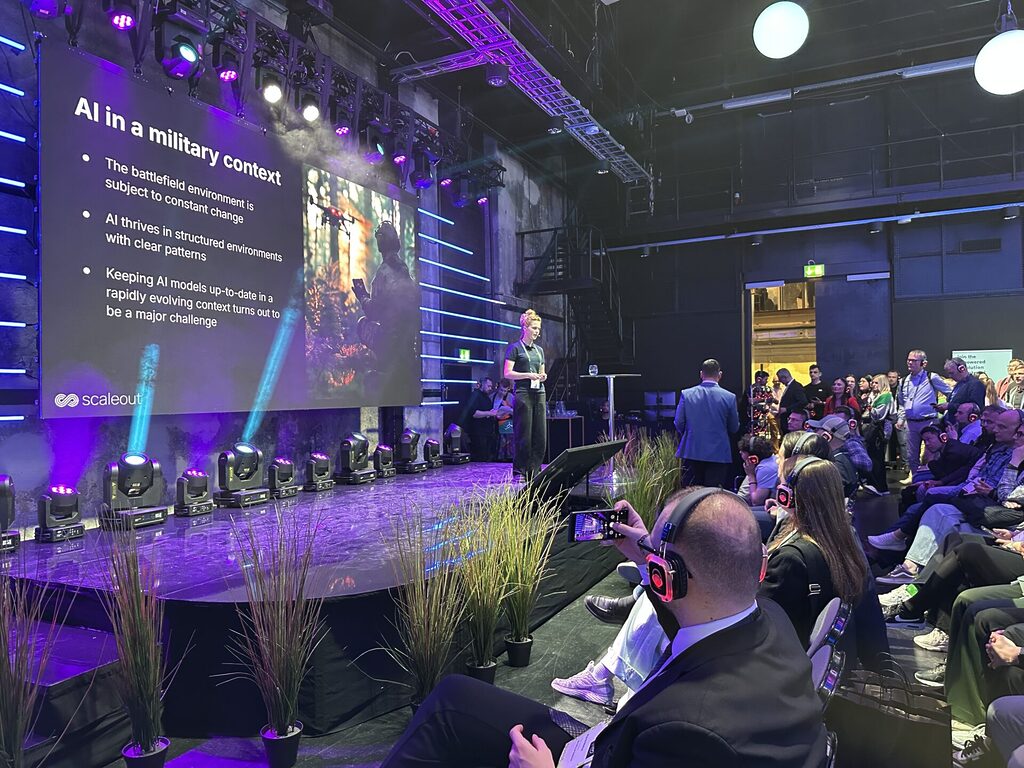
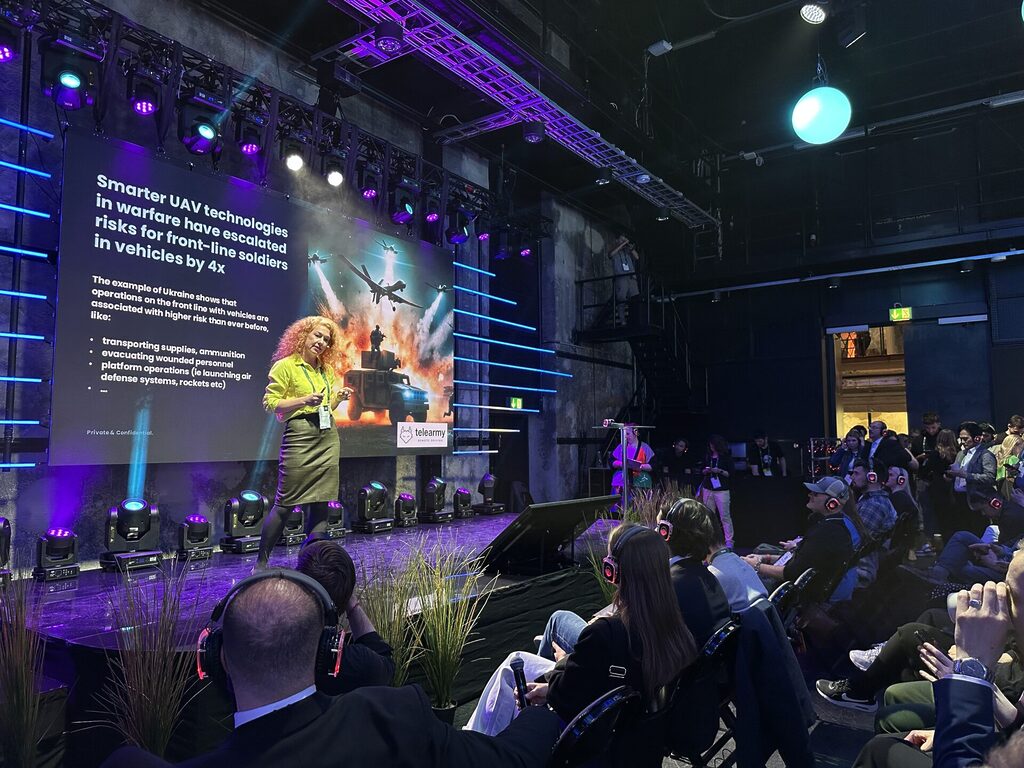
Also pitching on stage were startups from the Startup Incubator: Kulg, SoFutu, Raal, KontorVA, and KindelAI. They were supported with encouraging words by Kätlin-Carolin Noormägi, Community Manager at the Startup Incubator.
Anne-Liisa Elbrecht, Head of the Tehnopol Startup Incubator, participated in a panel discussion on the role and importance of founders. The panel explored whether the lack of founders is a problem and what role they play in today’s business landscape.
The conference program also featured innovative formats – for example, a roundtable series where five discussions took place simultaneously on different topics. One of the discussions was led by Olga Kurdovskaja, Program Manager of the Film and Multimedia Accelerator at the Startup Incubator, and Kristi Jõeäär, Head of Marketing and Communications at Tehnopol. They explored the question: why might the film industry be the next big opportunity for startups? The table quickly filled with interested participants, clearly showing both the relevance of the topic and the credibility of the hosts.
On Friday, startups participating in the Zebra ScaleUp project took the spotlight on the pitching stage: Antscape, Contractok, KontorVA, Kratt Services, Marleq, Renster Online, KindelAI, Tuntu, and Bondauttaja. They were introduced by Maarit Jalakas from Tehnopol.
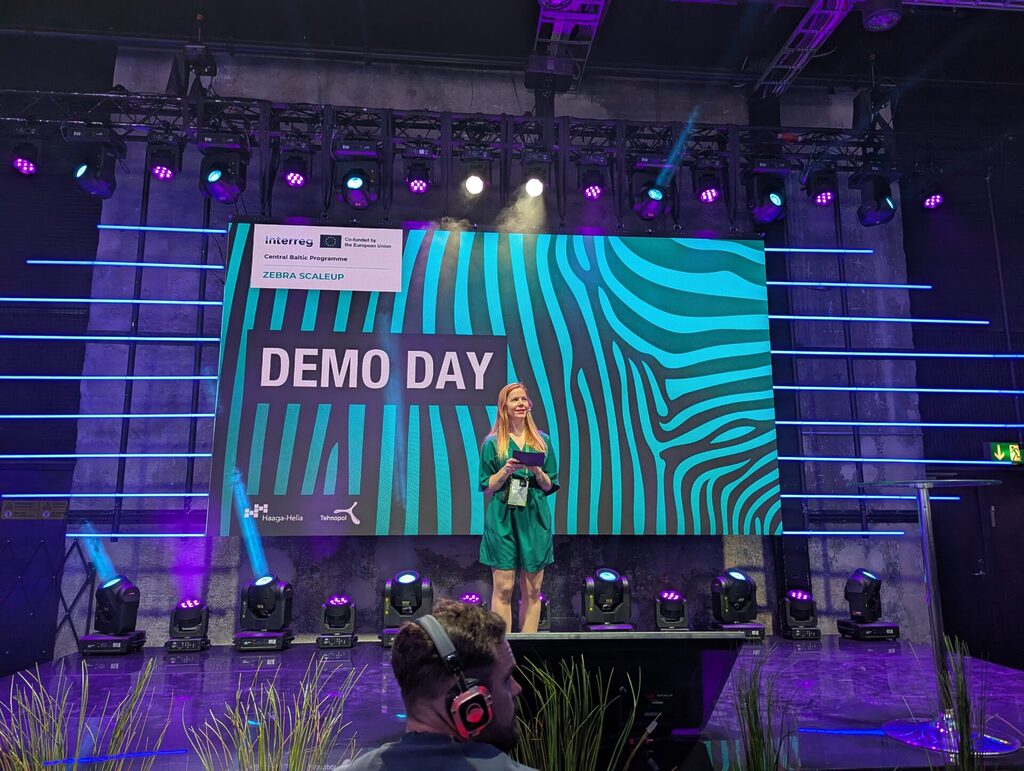
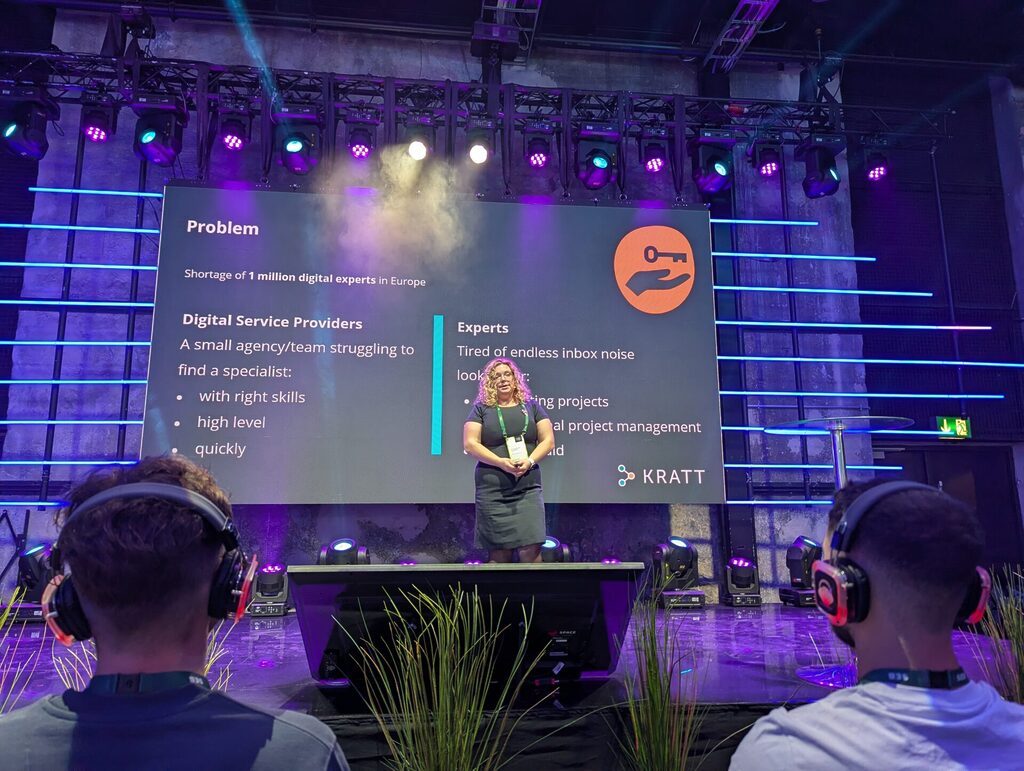
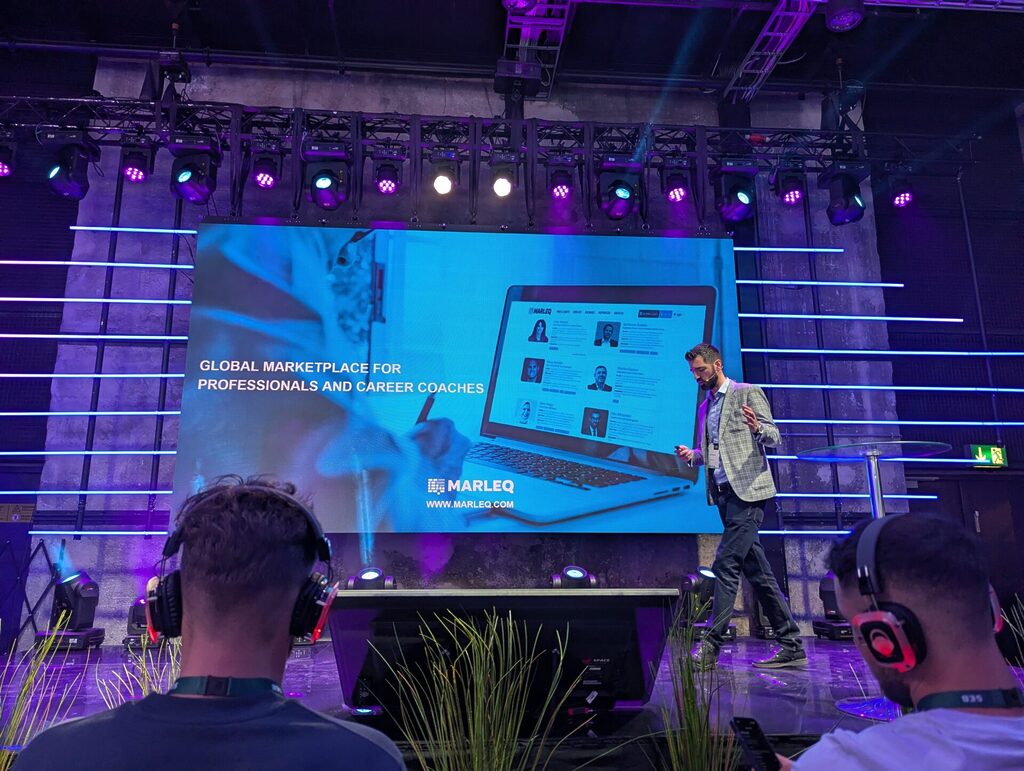
At the Tehnopol booth, visitors had a unique chance to have their portraits drawn by an AI guided robot hand, thanks to a solution provided by Photobooth.ee.
Once again, Latitude59 proved that Estonia’s startup community is full of creativity, collaboration, and vision. A big round of applause to everyone who made it all possible!
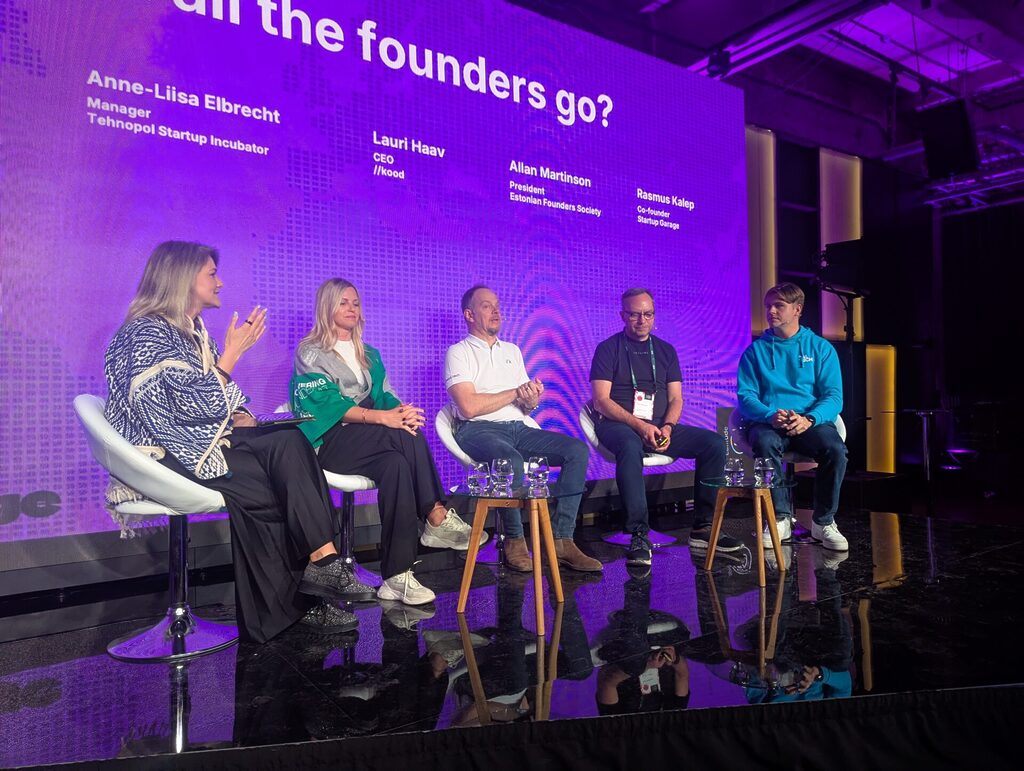
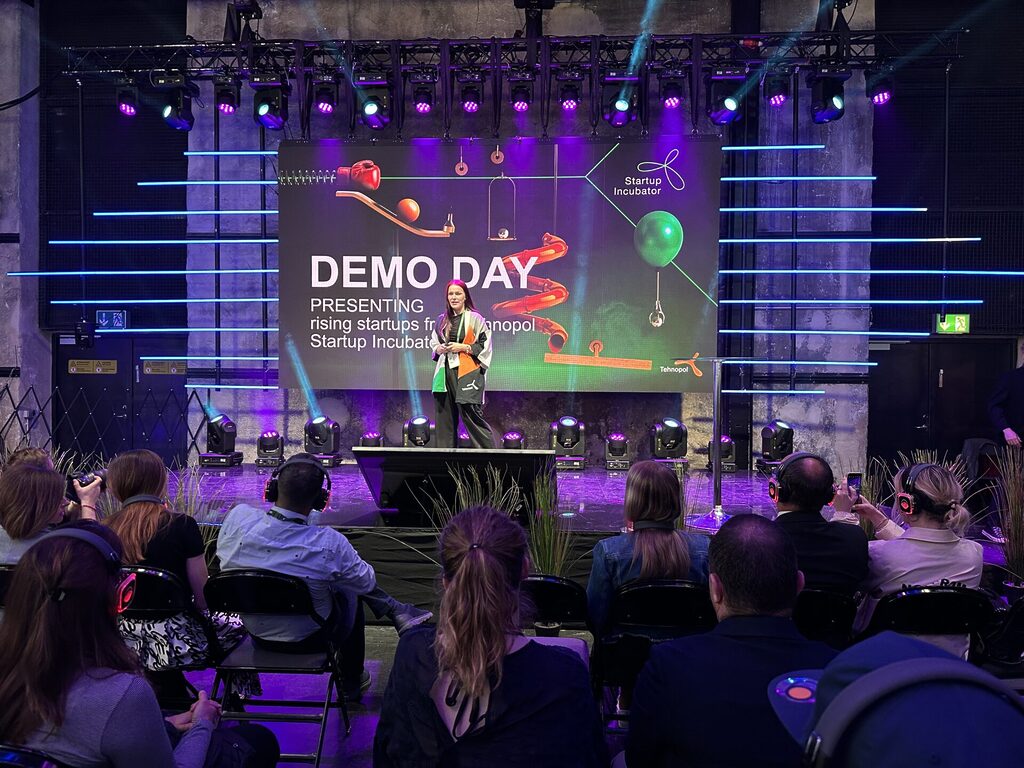
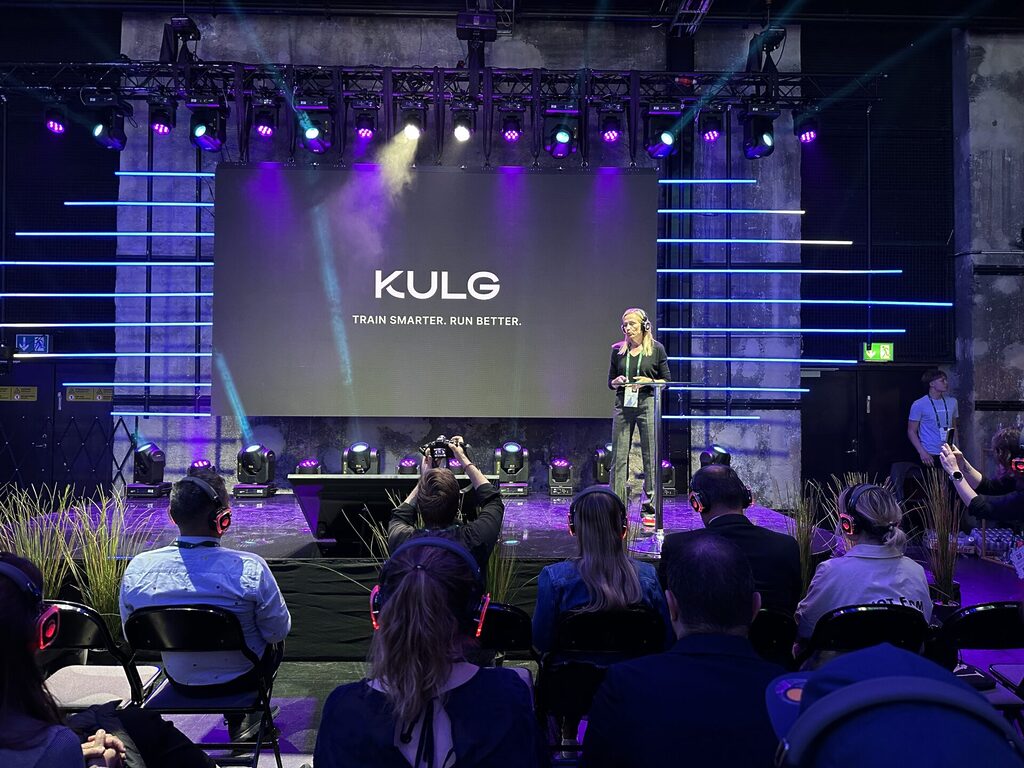
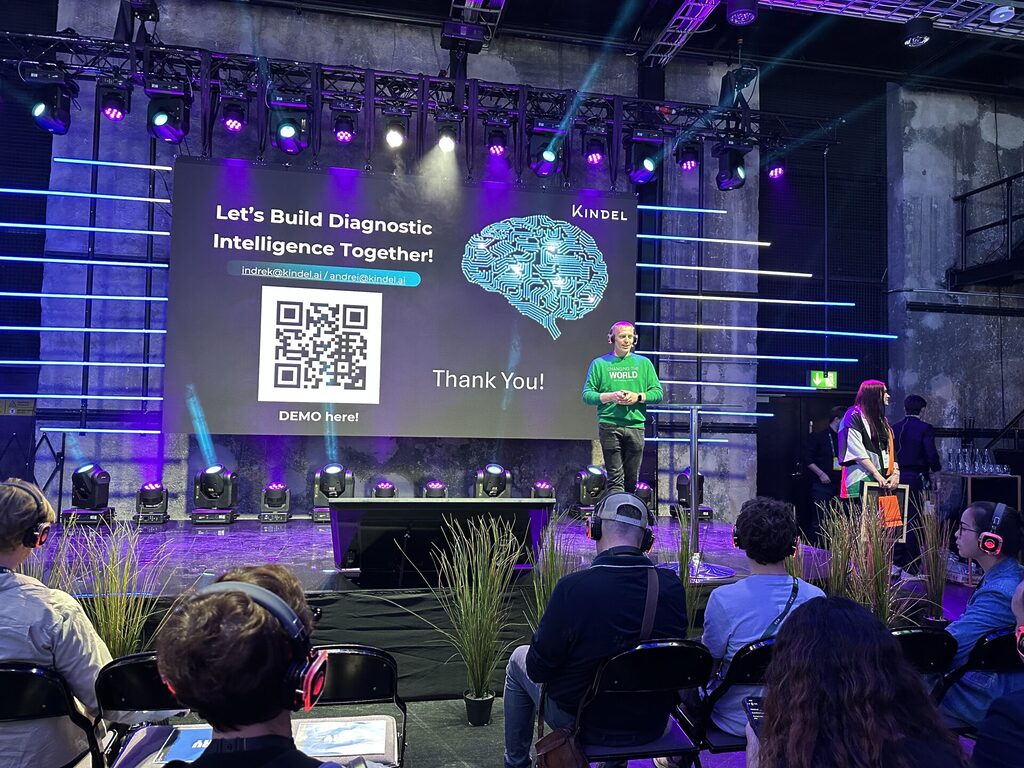


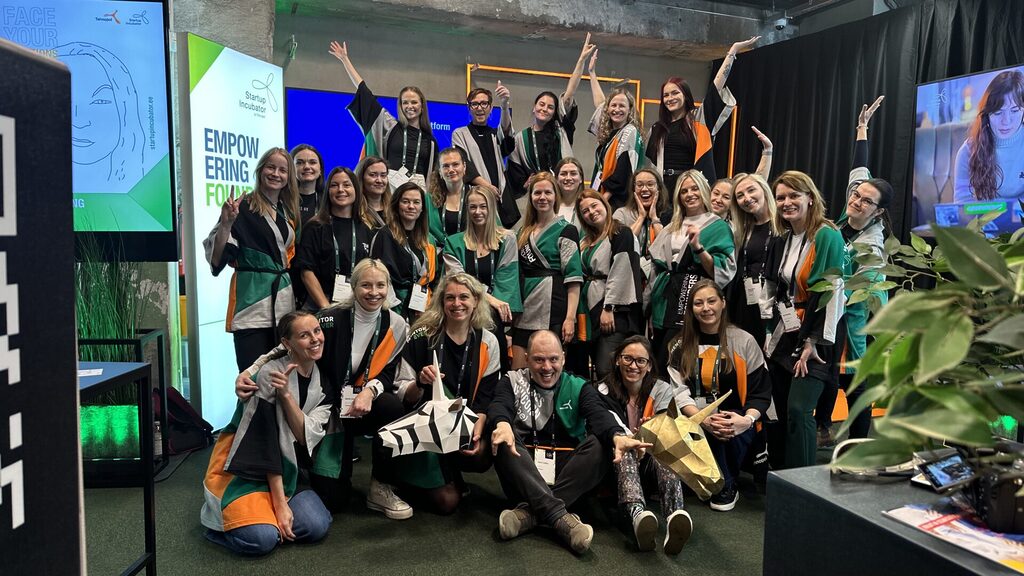
Defence technologies developed in Estonia capture the attention of NATO leadership
On 21 May, dual-use technology companies selected for the NATO DIANA innovation accelerator gathered in Estonia alongside local defence tech firms to showcase solutions designed to strengthen the defence capabilities of NATO member states. The event brought together international investors, representatives from the defence forces, governmental officials, and key industry experts. Nearly 30 members of the NATO DIANA Board of Directors from across the alliance were present to explore the innovations developed within the accelerator.
Kadri Tammai, Regional Director of NATO DIANA, who observed the product demos on site, emphasized the importance of innovative technologies. “Today, we have money, readiness, and opportunities in the market, but there are still too few companies focused on defence. To rapidly strengthen our defence capabilities, we must not underestimate the significance of new innovative technologies alongside the traditional defence industry, and it is exactly these kinds of companies that NATO DIANA aims to support,” Tammai said.
Over the past five months, seven international companies have been developing their technologies in Estonia in close cooperation with local defence experts, validating their solutions in a range of specialised test centres.
“It has been a great honour and responsibility to be part of the development journey of seven outstanding innovation companies over the past five months,” said Anne-Liisa Elbrecht, Head of the NATO DIANA Estonia Accelerator, as well as Tehnopol Startup Incubator. “The companies’ dynamism, technological expertise, and genuine commitment to contributing to collective security reflect the growing role of deep tech in strengthening defence capabilities. Such dedication and pace confirm that through collaboration between the research, business, and security sectors, we can meet the security challenges of today as well as the future.”
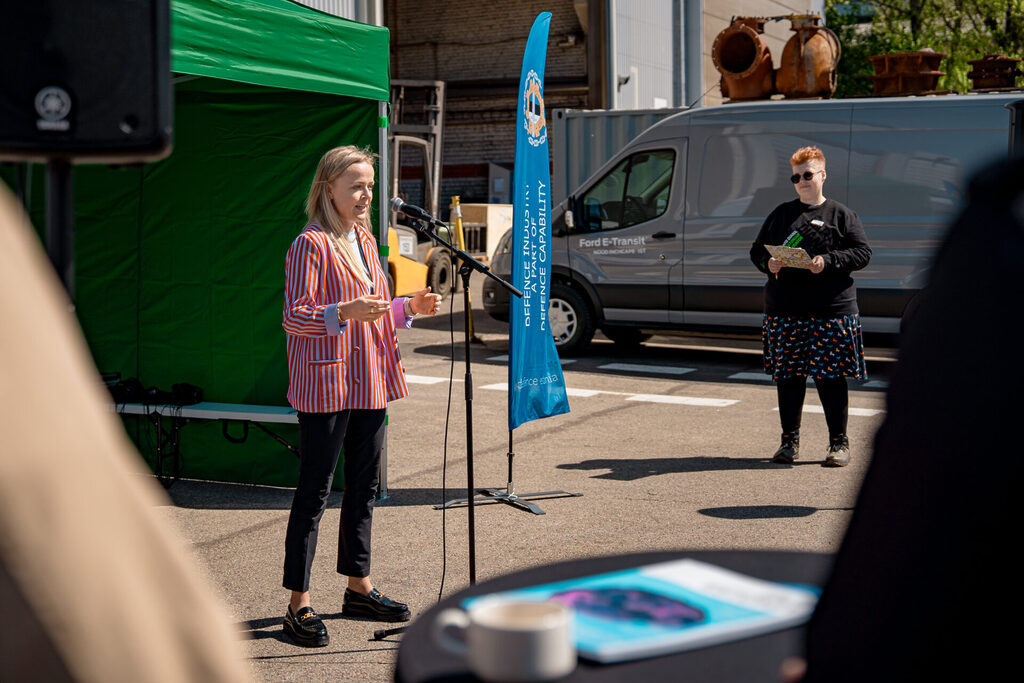
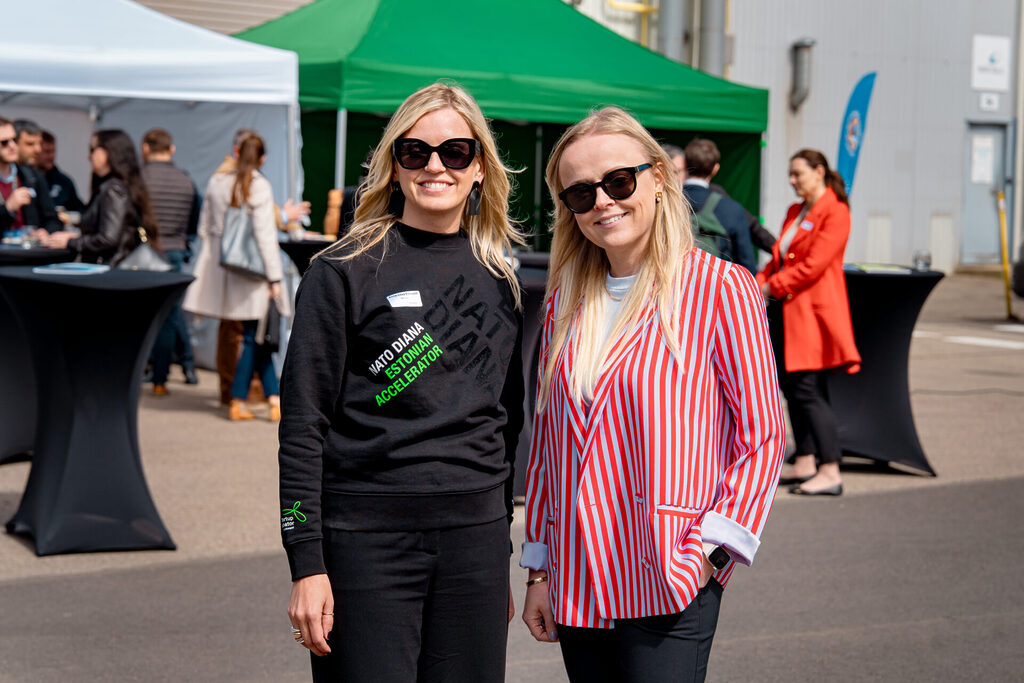

Interest in the programme has grown significantly since its pilot year, which attracted around 1,300 applicants. In 2025, more than 2,600 companies applied, with only 74 selected to join. Despite the fierce competition, two Estonian companies—Telearmy and Wayren—secured a place. Wayren, a deep tech startup founded by former cyber defence officers, recently signed a €7.9 million strategic investment agreement with EFA GROUP, one of the world’s leading defence industry corporations.
Henry Härm, Co-founder and CEO of Wayren, highlighted the critical role of networking in their success within the DIANA programme: “The DIANA accelerator has provided us with access to world-class networks, training, and testing opportunities through Tehnopol and Sparkup Tartu Science Park. The programme has been instrumental in developing our product and scaling the company, which ultimately led to a €7.9 million strategic investment agreement. Events like the Demo Day give DIANA companies the chance to build valuable connections with end-users and investors. We strongly encourage other dual-use startups to apply and take advantage of the opportunity to work with leading innovators, experts, and stakeholders.”
Wayren’s communication platform enables secure, resilient communications between soldiers, command centres, and platforms even under complex battlefield conditions.
Sigrid Rajalo, Head of the Innovation and Technology Department at the Ministry of Economic Affairs and Communications, and Estonia’s representative on the NATO DIANA Board of Directors, noted that DIANA is soon to reach full operational capability ahead of NATO’s summer summit. “The NATO DIANA cross-alliance accelerator has already become an undisputed leader in defence innovation. Estonia has been a strong supporter of this initiative from the very beginning, which is why it was a great honour to host the official meeting of the DIANA Board of Directors in Tallinn yesterday, where the final key decisions were made ahead of the NATO summit.”
The next NATO DIANA application round and a new set of dual-use challenges will be announced in June, with introductory webinars for interested applicants taking place at the end of May. All dual-use deep tech companies registered in a NATO member state are eligible to apply.
The defence technology demo day was organised in collaboration with Defence Estonia and Invest Estonia. It was an official side event of Latitude59. The NATO DIANA Estonia Accelerator is run by Tehnopol Startup Incubator in cooperation with Sparkup Tartu Science Park. The programme is funded in Estonia by the Ministry of Economic Affairs and Communications and supported by the Ministry of Foreign Affairs, the Ministry of Defence, and the City of Tallinn. Contributors to the alliance-wide network of test centres in Estonia include TalTech, the University of Tartu, CR14, the Estonian Military Academy, the Estonian Academy of Security Sciences, the Estonian Aviation Academy, and Metrosert.
See the full photo gallery here!
